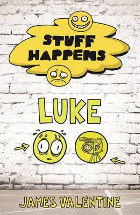Stuff happens: Luke by James Valentine

Puffin Books, 2016. ISBN 9780143308973
Every now and then everyone gets scared - that's normal. But when
even the mere thought of something like a spider, being shut in a
small space, going into the outdoors, the calendar showing Friday
the 13th totally freaks you out, then that's a phobia. And Luke has
the most common phobia of all - glossophobia, the fear of public
speaking. He can talk normally with his mates, his family, even his
teacher in informal situations but ask him to speak in front of a
crowd, even his classmates, and he freezes. The words just don't
come at all.
As the summer holidays come to an end and Year 5 looms, he is
freaking out that he will be in 5H, Miss Hobbie's class, because
everyone knows that Term 2 is Speech Term and the whole focus is on
preparing a speech for the class in the final week. And his panic
continues as his name is called for 5H, even though it is just Day
One of Term One. Before he knows it Term Two arrives and as he
expected, it's Speech Term. Even though his classmates know of his
phobia and accept it as part of his being Luke, he labels himself a
loser because of it and he is unable to overcome his fear. He can't
even think of a topic, such is his mindblock. When Miss Hobbie
learns of his condition from Perfect Pupil Dan, she sets out to help
him suggesting he talk about phobias generally thinking that it will
help Luke understand his condition and that it is very common. But
it is his Dad, the one with his own YouTube channel, who comes up
with the ultimate solution. Yet, when the big day comes Luke faints
- even understanding that he has a phobia and being able to be
word-perfect with his speech does not negate it. Even fainting does
not deter Miss Hobbie from insisting he deliver so while Luke
doesn't overcome his fear, he finds a solution that not only works
for him but leads him down a new pathway, one that will build a
stronger relationship with his dad.
Each year students across Australia participate in public speaking
assignments whether they are comfortable like Dan or fearful like
Luke. There is an expectation that it is something that comes easily
to kids who talk all the time anyway, and it will help them learn to
articulate their thoughts in formal situations, use their voices and
body language effectively, and boost their confidence in themselves.
But what if there are those like Luke? What if this expectation of
having to speak, let alone compete, starts to grip them months
before the actual delivery date? Teachers who seem to be comfortable
in speaking to large groups because it is such a part of what we do,
can learn as much from this new book in this terrific series as Luke
does.
So often boys see their fears and inabilities as weaknesses. They
look at the Dans of the world who seem to be so confident and so
able and compare themselves, find they don't measure up and label
themselves losers, so affecting their self-esteem and
self-confidence that it often becomes a downward spiral sometimes
with disastrous consequences as they hit their teens. The facts and
statistics for suicide in Australia are scary http://www.mindframe-media.info/for-media/reporting-suicide/facts-and-stats
and while we are not in the top 25 countries, nevertheless there are
nearly 8 deaths each day because of it. While reading Stuff
happens is not necessarily going to impact on that rate, the
stories that are told are important for boys to see that no one is
an all-macho hero like their comic-book favourites or even the peers
they have put on a pedestal, that everyone has at least one Achilles
heel and that the things that worry and scare them also worry and
scare their friends. They are not alone. Susannah McFarlane, the
series editor, has created something akin to the Men's Shed for boys
with this collection of stories that are so modern and so relevant.
World-class authors who create stories about the everyday things and
write them in an unpatronising way that speaks directly to the
reader, helping them to understand that not being able to do this or
fearing that have to have an impact. It's OK to not be 'perfect' and
with each story ending on such a hopeful note for the future, young
readers are encouraged to seek their own solutions. No wonder this
series is so popular with my boy readers.
Barbara Braxton